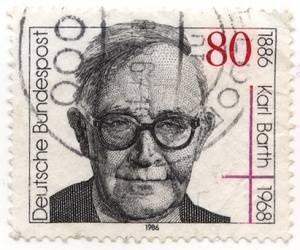Theology ultimately should be a very concrete thing, at least for the Protestant Christian. We are people of the Word of God; we are people who have been radically brought into the life of God by a deep sense of the theology of God’s Word as that has confronted us in the face of a man from Nazareth. It is this Word-grounded reality upon which we, then,  as Christians think a God-world / world-God relation; that is, through the analogy of the hypostatic union, of the Theanthropos Godman, Jesus Christ. And it is as we have come to know this reality by the Holy Spirit that we come to know what creation is for, what history is in fact; that its inner reality, as Barth so presciently articulates, is God’s covenant life of grace for the world in Jesus Christ. It is in this type of context that he pens the following words with reference to what in fact the entailments of ‘real history’ are:
as Christians think a God-world / world-God relation; that is, through the analogy of the hypostatic union, of the Theanthropos Godman, Jesus Christ. And it is as we have come to know this reality by the Holy Spirit that we come to know what creation is for, what history is in fact; that its inner reality, as Barth so presciently articulates, is God’s covenant life of grace for the world in Jesus Christ. It is in this type of context that he pens the following words with reference to what in fact the entailments of ‘real history’ are:
To distinguish it from world history, national history, the history of civilisation and even Church history, the conservative theology of the 19th century called it the history of salvation. The expression is materially correct and important. In the sequence of these events—from creation to the dawn of the last time (our own) with the birth, death and resurrection of Jesus Christ—we have to do indeed with the provision and revelation of salvation, or, to be more precise, of man’s indispensable deliverance by his reconciliation with God as a presupposition of his eternal redemption and fulfillment. But this history of salvation is not just one history or element among others. It is not just a kind of red thread in the texture of all other history, of real history. Those who use the expression “history of salvation” must take good care that it is not transformed in their hands into the secular concept of “history of religion,” i.e., the history of the religious spirit, which as such can only be one history among many others in the context of history generally. The history of salvation is the history, the true history which encloses all other history and to which in some way all other history belongs to the extent that it reflects and illustrates the history of salvation; to the extent that it accompanies it with signs and intimations and imitations and examples and object-lessons. No other history can have any independent theme in relation to this history, let alone be a general and true history in the context of which the history of salvation can only be one among others. The covenant of grace is the theme of history. The history of salvation is the history.[1]
There critics of Barth who like to claim that his notion of Historie is in fact some sort of idealist trope, and thus a kind of “metaphysical” (ironically) Geschichte that stands behind and above historical history of the type we experience on a daily basis in the lived world. The passage above should provide greater context towards thinking about the way Barth thinks about all of history being circumscribed by God’s life in the covenant of grace; as such it is His life, His history for the world in Christ, in the concrete, that indeed is what illumines history in a way that has genuine and lasting meaning and hope.
If you would like to read on these matters further you can read an old blog post my friend wrote with reference to these things here.
[1] Karl Barth, Church Dogmatics III/1 §41 The Doctrine of Creation: Study Edition (London: T&T Clark, 2010), 60.
